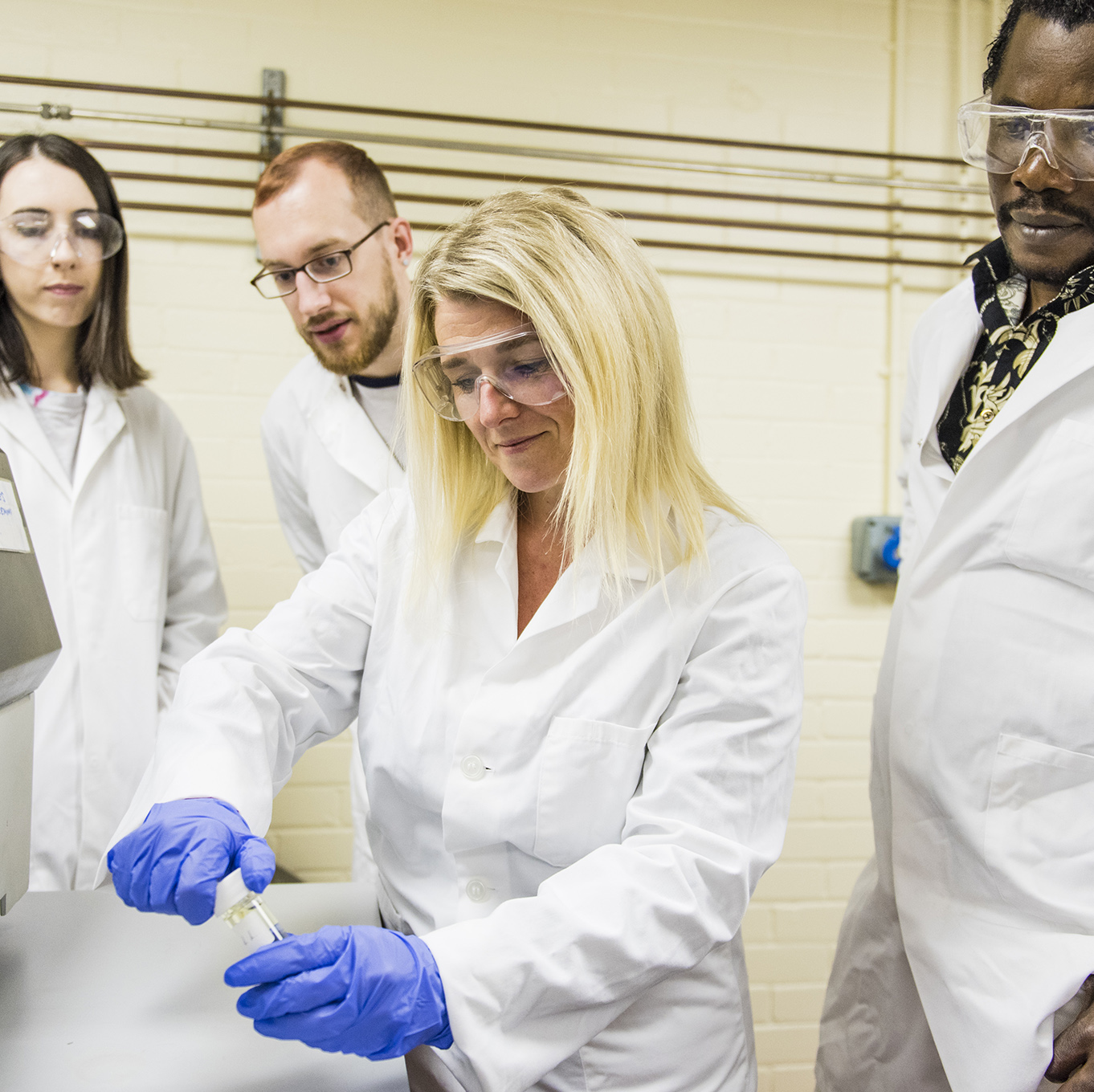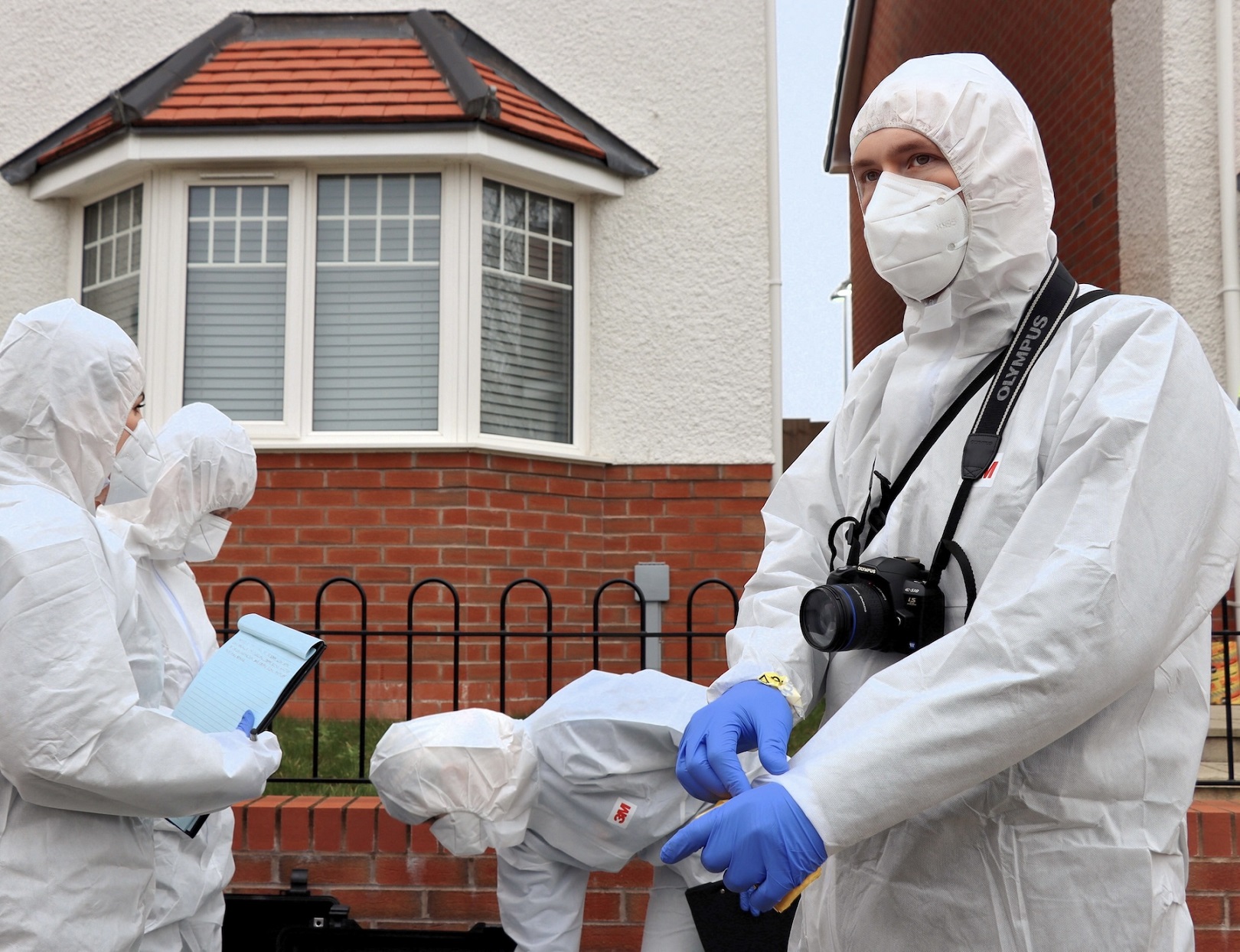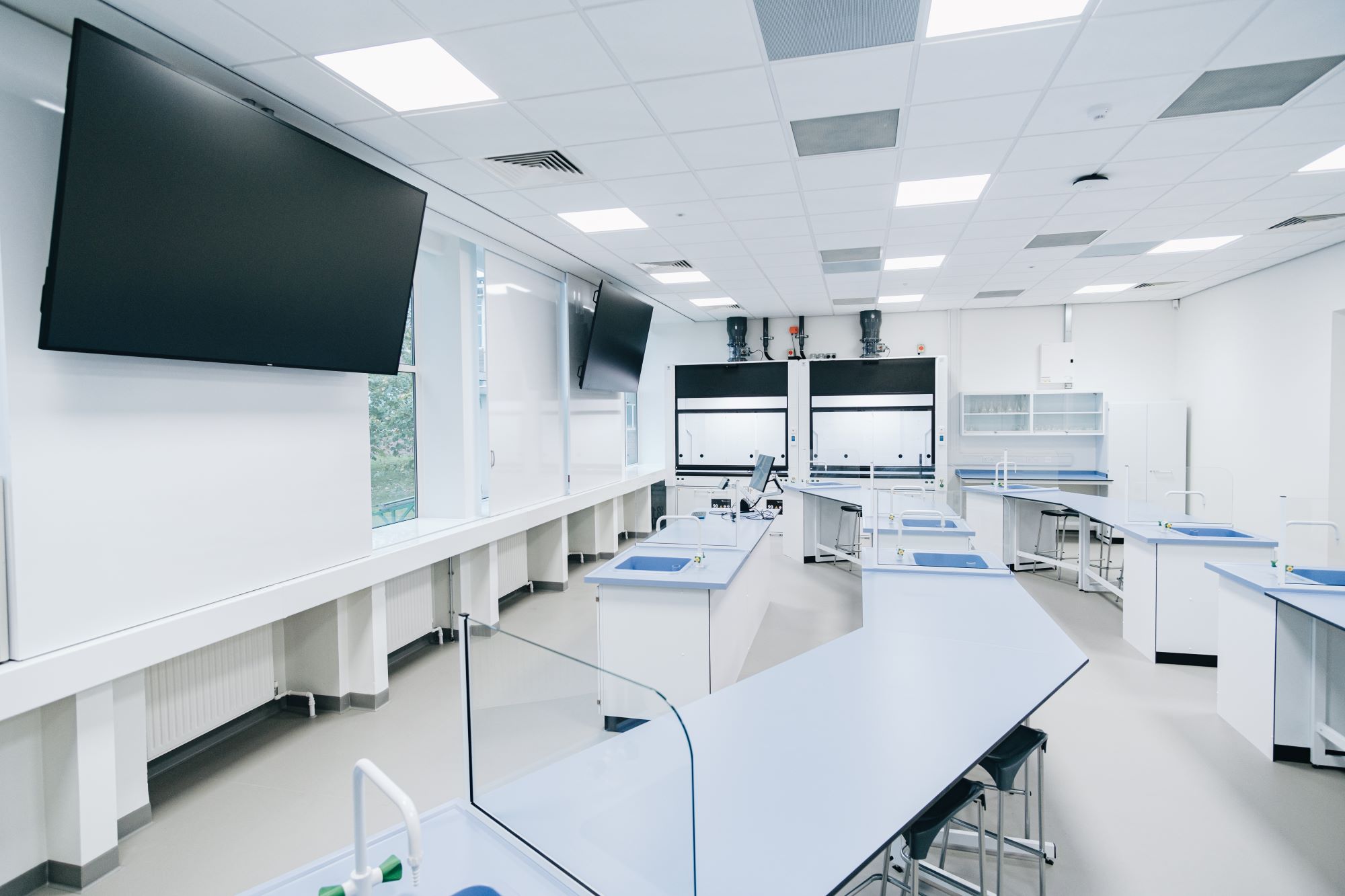BSc (Hons) Biomedical Science
.jpg)
Course details
UCAS Code
BS21
Year of entry
2024, 2025
Duration
3 YRS (FT), 6 YRS (PT)
UCAS Tariff
80-112
Institution Code
G53
Location
Wrexham
Course Highlights
IBMS
accreditation
Utilises brand new
laboratories
Partnered with
the local Betsi Cadwaladr University Health Board (BCUHB)
Why choose? this course?
Our BSc (Hons) Biomedical Science degree is relevant and employer ready, utilising a partnership between Wrexham University and the Betsi Cadwaladr University Health Board (BCUHB).
This course:
- Is taught by academics across the university, biomedical scientists and other health professionals with a range of subject and research expertise.
- Includes modules led and delivered by current Biomedical Science practitioners.
- Has access to brand new laboratories on the Plas Coch campus.
- Has an option for undertaking work within North Wales clinical laboratories.
- Allows you to develop independent research projects, that can be conducted within clinical laboratories.
- Utilises local research laboratories, housing state-of-the-art equipment, such as flow cytometry, fluorescence microscopy and molecular analysers.
- Follows our Active Learning Framework (ALF), which embraces the importance of flexibility, accessibility and building a sense of community.
- Will enable you to develop a thorough grounding in ethical and reflective practice, with sound subject specific and research knowledge base.
- Enhances your analytical skills with laboratory-based investigations employing biomedical methodology.

Key course features
- Our Biomedical Science degree is accredited by the Institute of Biomedical Sciences (IBMS).
- Developed in conjunction with the local University Health Board to ensure an authentic and contemporary education within real biomedical settings, embedded throughout the programme.
- Has access to new, highly specialised facilities based within the university, local research centres and clinical laboratories.
- The curriculum and assessment are reviewed regularly through liaison meetings with local employers and NHS laboratories to ensure students are equipped with the latest thinking in the Biomedical Science field.
- Includes an optional foundation year to prepare you for further years of study by building on your fundamental science knowledge and academic study skills.
- Inclusive and supportive teaching with tutorial support available through the medium of Welsh.
What you will study
YEAR 1 (LEVEL 4)
Year one of our degree programme establishes a platform of core knowledge across key subject areas including biology, physiology, mathematics and statistics, whilst also introducing students to immunology and microbiology. Specific modules ensure the acquisition of the necessary laboratory skills and a well-grounded understanding of professional issues relevant to the Biomedical Scientist.
MODULES
- Professional Practice for the Biomedical & Life Sciences: The module aims to introduce you to the theoretical, practical, and professional aspects of the Biomedical & Life Sciences.
- Cell Biology, Biochemistry & Genetics: This module will enable you to become familiar with cell structural components, biochemistry and how cells function, with particular emphasis on genetics and DNA structure. It will also introduce relevant laboratory techniques.
- Maths and statistics for science: Gain the required level of mathematics for university science programmes. Basic statistics, probability and data analysis will also be covered in this module to prepare for future modules.
- Essential skills for the Life Sciences: Develop essential skills in laboratory procedures, appreciate ethics, the link between theory and experimentation and associated analysis. It will also develop and improve experimental report writing skills.
- Health, Wellbeing and the Body: This module will develop an understanding of the normal physiological functioning of the main body systems, and the maintenance of homeostasis in healthy individuals.
- Introduction to Immunology & Microbiology: This module will equip you with core knowledge in the fields of microbiology and immunology and enable you to carry out practical work in microbiology and pathology laboratories.
YEAR 2 (LEVEL 5)
Year two of the programme largely comprises specialist modules to give you the necessary knowledge in key areas of biomedical science. You will be primed in research methodology and will design and carry out a mini project to prepare you for the final year project. Practical skills are reinforced in a 5-week intensive block spent at the Betsi Cadwaladr University Health Board.
MODULES
- Cell & Molecular Biology: This module will develop further knowledge that builds from year one. It will explore essential functions of the cell including metabolism, DNA replication and gene expression. It will also explore molecular biology in depth and topics such as polymorphic markers, RFLP analysis and genetic disease.
- Blood Sciences: Develop an understanding of transfusion science and various clinical haematological and biochemical (blood sciences) disorders, and develop an in-depth knowledge of the laboratory investigations performed in the diagnosis and management of such diseases.
- Research Methods, Theory and Practice: This module will enable you to develop critical thinking and problem-solving skills in a research context and prepare to undertake a research project.
- Cellular & Histopathology: Develop a critical appreciation of the clinical and laboratory importance of cytology and histopathology in the diagnosis and management of human disease.
- Applied & Medical Microbiology: Establish a broad and deep knowledge of microbial pathogens, their life cycles and interaction with human and other hosts. It will explore control measures, microbiological tests and application to case studies.
- Advanced Laboratory Skills for the Biomedical & Life Sciences: The module introduces you to advanced Biomedical & Life Science laboratory techniques, to develop an understanding of Regulatory Issues, Health and Safety, and the application of academic knowledge in a Pathology Laboratory context.
YEAR 3 (LEVEL 6)
The final year of study focuses upon topics at the forefront of current research in biomedical science and will further develop your critical and analytical skills. A significant part of the final year is a 40 credit research project in which you will carry out an independent piece of research in an area of special interest.
MODULES
- Research project: Integrate and apply knowledge gained during your degree studies in a self-motivated, practical, enquiring and problem solving manner, thereby extending your own learning to a specific area in applied science. It will also develop your practical research expertise and prepare you for postgraduate study/graduate level employment in an area of applied science.
- Biology of Disease: The module develops the concept of disease within the context of the normal physiological mechanisms. It will explore pathophysiology of common conditions, beginning with a critical understanding of the pathological mechanisms of selected tissues, organs and organ systems and related pharmacology.
- Clinical Genetics & Cancer Biology: The module will allow you to develop an understanding of modern techniques for identification and study of genes involved in human disease. It will involve investigating the pathology of significant human inherited genetic disorders, genetic screening, human gene therapy and personalised medicine. In addition, cancer biology, tumour cells, oncogenes, tumour suppressor genes and epigenetics of cancer.
- Infectious Disease, Immunity & Inflammation: This module will foster evaluation of the relationships that exist between aspects of human biology, infection control and medical microbiology, the role of inflammation and the specific and non-specific immune responses, and the molecular and cellular pathology of diseases involving the immune response (e.g. immune deficiency).
- Advances in Medicine: Diagnostics & Therapeutics This module will allow you to develop an understanding of major diagnostic methods, therapeutic interventions and treatment strategies (medical and surgical) in the management of major diseases and disorders.
This summer, you can gain the fundamental scientific knowledge and skills needed to progress onto one of our Applied Science degrees, with our Science Summer School.
The information listed in this section is an overview of the academic content of the programme that will take the form of either core or option modules. Modules are designated as core or option in accordance with professional body requirements and internal academic framework review, so may be subject to change.
Entry requirements & applying
The academic requirements for the course are 80-112 UCAS tariff points at GCE A-level or equivalent, including a science at level 3.
Teaching & Assessment
Underpinned by the University Active Learning Framework (ALF), the course will involve a number of flexible approaches:
- Synchronous (live) and asynchronous (pre-recorded) sessions
- Laboratory practical sessions Lectures, seminars and group tutorials
- Self-directed study and independent tasks
A learning blend will be used, which will vary between modules. There will be a minimum amount of on campus activities (3 days per week for each level of the programme), online sessions and interactive activities.
A broad range of assessment methods are used; these include learning journals, group projects, portfolios, coursework, literature reviews, oral and poster presentations, case studies and laboratory reports, and exams/in-class tests. Each module is assessed by a variety of methods, enabling students to display their full potential. A project dissertation will form one of the final parts of your assessment. Most assignments will involve electronic submission.
Teaching & Learning
Wrexham University is committed to supporting our students to maximise their academic potential.
We offer workshops and support sessions in areas such as academic writing, effective note-making and preparing for assignments. Students can book appointments with academic skills tutors dedicated to helping deal with the practicalities of university work. Our student support section has more information on the help available.
In terms of particular needs, the University’s Inclusion Services can provide appropriate guidance and support should any students require reasonable adjustments to be made because of a recognised prevailing disability, medical condition, or specific learning difference.
Career prospects
The course creates wide-ranging opportunities for employment in the following fields:
- Biomedical scientist (NHS/private sector)
- Biotechnology industry (research and development)
- Pharmaceutical industry (research and development)
- Food and water industry (testing, research and development)
- Medical Sales
- Healthcare support worker
- Veterinary laboratory worker
- Academic researcher
- Teaching
Qualifications:
This course provides preparation for undertaking the Institute of Biomedical Science Certificate of Competence (a compulsory requirement for being a registered Biomedical Scientist affiliated with the Health & Care Professions Council).
It prepares students wishing to undertake a career in research, teaching, medicine, dentistry or to pursue studies towards our MSc Biomedical Science degree, a PhD or Postgraduate Certificate in Education (PGCE).
Completion of this degree will also ensure employment opportunities outside of immediate biomedical science areas such as management and finance roles.
The BSc (Hons) Biomedical Science course is relevant and employer ready, utilising a partnership between Wrexham University and the Betsi Cadwaldr University Health Board (BCUHB). It is accredited by the Institute of Biomedical Sciences (IBMS). It is taught by an experienced team of academics, biomedical scientists and other health professionals with a range of subject and research expertise.
IBMS degree accreditation ensures that a degree course covers the academic components of the standards of proficiency at the required level, so we meet the Health and Care Profession Council (HCPC) standards of proficiency for biomedical scientists. Students also receive a wide-ranging, research-informed scientific education and develop practical skills and experience that employers value.
Our Careers & Employability service is there to help you make decisions and plan the next steps towards a bright future. From finding work or further study to working out your interests, skills and aspirations, they can provide you with the expert information, advice and guidance you need.
Fees & funding
You do not have to pay your tuition fees upfront.
The fees you pay and the support available will depend on a number of different factors. Full information can be found on our fees & finance pages. You will also find information about what your fees include in the fee FAQs.
All fees are subject to any changes in government policy, view our undergraduate fees.
Accommodation
If you’re looking for a place to stay while you study then take a look at our accommodation pages to get more information on your options, including our on-campus halls of residence Wrexham Village.


